

Regulatory affairs officer: Job description. Regulatory affairs officers ensure the appropriate licensing, marketing and legal compliance of pharmaceutical and medical products in order to control the safety and efficacy of products.
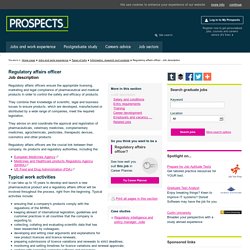
They combine their knowledge of scientific, legal and business issues to ensure products, which are developed, manufactured or distributed by a wide range of companies, meet the required legislation. Regulatory affairs officer: job description. Regulatory Affairs Officers act as a link between companies and regulatory authorities, ensuring that products are manufactured and distributed in compliance with appropriate legislation.
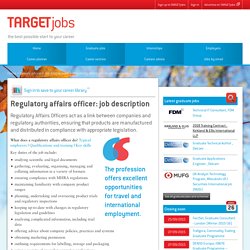
What does a regulatory affairs officer do? Typical employers | Qualifications and training | Key skills Key duties of the job include: Typical employers of regulatory affairs officers Chemicals manufacturers Pharmaceuticals manufacturers Herbal treatments manufacturers Pesticides manufacturers Medical devices manufacturers Veterinary treatment manufacturers Homeopathic medicine manufacturers Research organisations Medicines and Healthcare Products Regulatory Agency (MHRA) InformationService RegulatoryAffairs. First steps. A graduate's perspective. With his degree in Biology at Oxford Brookes University followed by a Masters in Environmental Science at the University of Aberdeen, Graham Donaldson thought he would eventually forge a career for himself in the environmental sector.
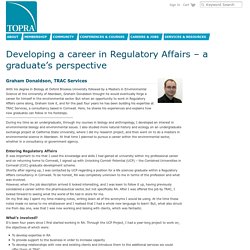
But when an opportunity to work in Regulatory Affairs came along, Graham took it, and for the past four years he has been building his expertise at TRAC Services, a consultancy based in Cornwall. Here, he shares his experiences and explains how new graduates can follow in his footsteps. ------------------------------------------------------ During my time as an undergraduate, through my courses in biology and anthropology, I developed an interest in environmental biology and environmental issues.
Case studies. So, what do you do?
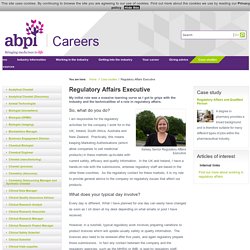
I am responsible for the regulatory activities for the company I work for in the UK, Ireland, South Africa, Australia and New Zealand. Practically, this means keeping Marketing Authorisations (which allow companies to sell medicinal products) in these markets up-to-date with current safety, efficacy and quality information. In the UK and Ireland, I have a hands-on role with the submissions, whereas regulatory staff are based in the other three countries. As the regulatory contact for these markets, it is my role to provide general advice to the company on regulatory issues that affect our products.
What does your typical day involve? Every day is different. However, in a nutshell, typical regulatory work involves preparing variations to product licences which will update usually safety or quality information. Do you work mostly on your own or as part of team? Both. How has your career developed since you entered the industry? Case studies. So, what do you do?
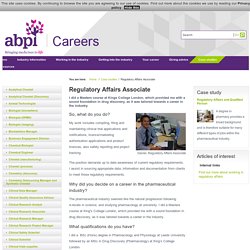
My work includes compiling, filing and maintaining clinical trial applications and notifications, licence/marketing authorisation applications and product licences, also safety reporting and project tracking. The position demands up to date awareness of current regulatory requirements. I assist in sourcing appropriate data, information and documentation from clients to meet those regulatory requirements. Why did you decide on a career in the pharmaceutical industry? The pharmaceutical industry seemed like the natural progression following A-levels in science, and studying pharmacology at university.
What qualifications do you have? I did a BSc (Hons) degree in Pharmacology and Physiology at Leeds University followed by an MSc in Drug Discovery (Pharmacology) at King’s College London. A five month industrial placement project with GlaxoSmithKline formed the basis of my dissertation, looking at relative steroid insensitivity in severe asthmatics. Case studies. So, what do you do?
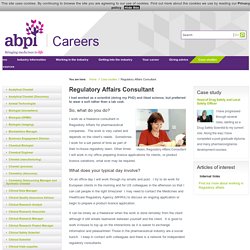
I work as a freelance consultant in Regulatory Affairs for pharmaceutical companies. The work is very varied and depends on the client’s needs. Sometimes I work for a set period of time as part of their in-house regulatory team. Other times I will work in my office preparing licence applications for clients, or product licence variations, what ever may be required. What does your typical day involve? On an office day I will work through my emails and post. It can be lonely as a freelancer when the work is done remotely from the client although it still entails teamwork between yourself and the client.
Research and development. The satisfaction of knowing that, because of your work, a medicine couldn’t be any better is huge.
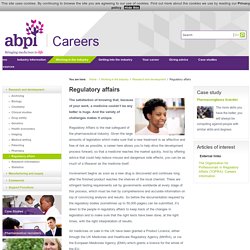
And the variety of challenges makes it unique. Regulatory Affairs is the real safeguard of the pharmaceutical industry. Given the large amounts of legislation which make sure that a new treatment is as effective and free of risk as possible, a career here allows you to help drive the development process forward, so that a medicine reaches the market quickly. And by offering advice that could help reduce misuse and dangerous side effects, you can be as much of a lifesaver as the medicine itself. Involvement begins as soon as a new drug is discovered and continues long after the finished product reaches the shelves of the local chemist. All medicines on sale in the UK have been granted a Product Licence, either through the UK Medicines and Healthcare Regulatory Agency (MHRA), or via the European Medicines Agency (EMA) which grants a licence for the whole of the EU. Back to top Back to top Research and development. Page Content The scientific endeavour to find new leads in innovative medicines has never been more efficient nor as fast.
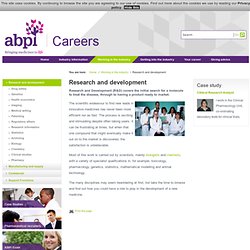
The process is exciting and stimulating despite often taking years. It can be frustrating at times, but when that one compound that might eventually make it out on to the market is discovered, the satisfaction is unbelievable. Welcome to the National Institute for Health and Clinical Excellence. U S Food and Drug Administration Home Page.